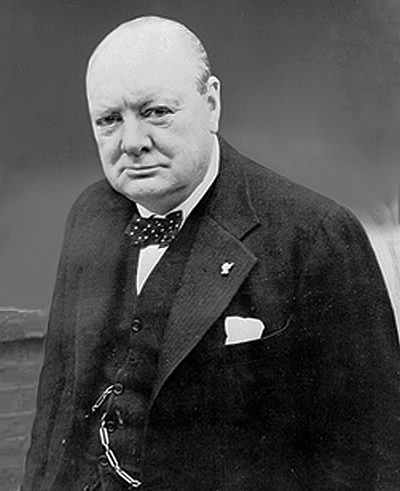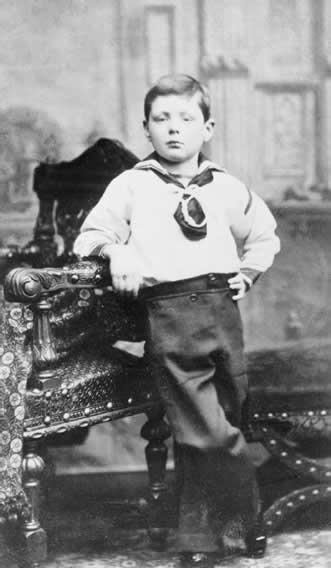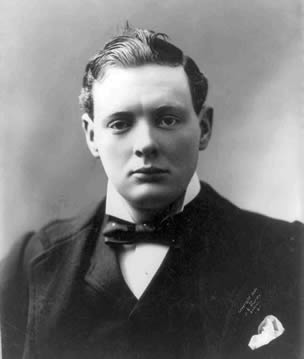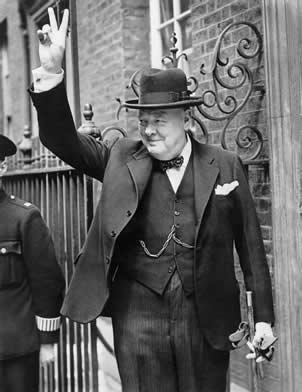Winston Churchill
A Chosen Instrument, but a Lost Man

by Dennis Pollock
Winston Churchill was born in 1874 to two parents who lived in the elite world of politics and privilege. His father was a member of parliament and his mother was a socialite of stunning beauty. Neither had much time for their son, and during his years at home he was primarily raised by his nanny, who showed him far more love and understanding than either of his parents. At the age of thirteen he was sent to boarding school, the usual practice among England’s elite.
Churchill was lonely and found he did not fit in easily with his peers. Even then the boy had a mind of his own, and had no desire to work hard at subjects that bored him, or which he felt would be of no practical value to him. Due to the lad’s dismal grades his father came to believe his son was lazy and without great natural abilities. At point the father wrote his son:
If you cannot prevent yourself from leading the idle, useless, unprofitable life you have had during those school days, you will become a mere social wastrel. And you will degenerate into a shabby, unhappy, and futile existence.
As Winston reached manhood and finished his regular schooling, he applied for admittance to the Royal Military College. He applied three times before passing the entrance exam. Finally, he was accepted and eventually graduated as a second lieutenant in the cavalry in 1895. He was now ready to seek glory and fame on the battlefield. There were no major wars being fought at that time, but because the British Empire was in a constant struggle to maintain and expand her colonial interests, there were all sorts of opportunities in smaller struggles. While in his twenties Churchill was involved in five separate wars and participated in many battles, shooting and killing the enemies of Great Britain with both skill and enthusiasm.
Early Days of Fame and Success
Churchill was certainly not the only British soldier achieving success on the battlefield in those days, but he became the most famous one. This was due to a gift that surfaced in his life at that time, a gift which would serve him well, both in publicity and his personal finances. This was the ability to write. As he joined one unit after another in participating in little wars to defend and protect the interests of the British Empire, he served as a war correspondent to several major British newspapers, and wrote several books about his experiences. Being no hack at self-promotion, he always painted himself in the best possible light, and consequently gained great favor and not a little celebrity status in the eyes of the British public.
During his years as a soldier, a peculiar trait of Churchill was manifested. The man was simply fearless. He reveled in battles and peacefully rode his horse in the midst of the thickest gunfire. Strangely he was never hit. Indeed, as his battles mounted and his “luck” seemed to hold, he began to see himself as invincible, one of providence’s favorites who could not be hurt.
Churchill ran for Parliament in 1900 and won. Within weeks he was making speeches and contending for his views and policies, showing little awe or deference toward his older colleagues. During his many years in politics he would win hearts, persuade doubters, and disarm enemies with his ability to speak on issues in a powerful and persuasive manner. In truth Churchill was more of a writer than a speaker. He was not especially quick on his feet, but he could put together words in a way almost nobody else could, at least in the political world. He quickly developed the habit of writing out every word of the speeches he would give.
Over the next forty years Winston Churchill would win elections and lose elections. He would rise to positions of great responsibility, and then be reduced to being out of favor and out of office. But while there were times when Churchill held no significant position, he was never far out of sight. His opinions, his books and articles, his running commentary on current events, and his genius at public relations and self-promotion kept him from ever completely disappearing.
 |
Winston as a child - even thenhe had leadership "swag." |
In 1932 Churchill took a trip to Germany to do research on a book he was writing. There he had his first exposure to the growing Nazi movement. Observing some of the proud young men marching in the streets, he formed an instant dislike of them, and accurately perceived the potential threat inherent in their racist demagoguery. This insight caused him to take Adolf Hitler seriously, something almost nobody else was doing in those days.
He wrote: “Only a few hours away by air, there dwells a nation of nearly 70 million of the most educated, industrious, disciplined people in the world, who are being taught from childhood to think of war and conquest as a glorious exercise, and death in battle as the noblest fate for man.”
Ascension to Power
As the years passed and Hitler’s popularity and power grew, Winston Churchill became almost a lone voice warning Britain of trouble to come, and insisting that Hitler was not a man to be pacified. England was riddled with a great many social liberals in those days, who felt it primitive and uncouth to speak about resisting “evil” men. In their minds, all men could be reasoned with, if only the right tactics were used. Churchill thought these men were crazy; they thought him simple-minded and unsophisticated.
When World War II finally broke out England and France found themselves at war with Germany and Italy. After facing early confusion and defeat, the British people lost all confidence in their Prime Minister, Neville Chamberlain, and he resigned. The stage was set for Winston Churchill to take the position he had longed for and dreamed of over the last half-century. In the desperate times of war, he seemed the natural man for the position.
Winston Churchill made many positive contributions to Britain’s war effort, but perhaps his greatest contribution came very early on, when France was being overrun by Germany, and many key leaders in England were insisting that they had no choice but to make peace with Hitler. Newly appointed Churchill met with his cabinet ministers and they discussed their options. At first some pressed for making peace and getting out of the war without too much loss. Churchill was in fine form that day and warned that to try to get any kind of deal with Hitler would result in Britain becoming a slave, puppet state, and that “the Germans would demand our fleet, our naval bases, and much else.” Then he closed with a rhetorical flourish that won the day:
And I am convinced that every one of you would rise up and tear me down from my place if I were for one moment to contemplate parley or surrender. If this long island story of ours is to end at last, let it end only when each of us lies choking in his own blood upon the ground.
The courage, the emotion, the stubborn refusal to bow to Germany’s power expressed in those words had a transforming effect upon the men who heard them. Boris Johnson writes: “At this the men in that room were so moved… that they cheered and shouted, and some of them ran around and clapped him on the back. Churchill had ruthlessly dramatized and personalized the debate… By the time the War Cabinet resumed at 7 pm, the debate was over… Churchill had the clear and noisy backing of the cabinet.”
Eloquence on Fire
As he moved that room of politicians and lords to stay the course, so it would be with the entire nation over the next years of the war. Churchill wasn’t just courageous and stubborn in the face of evil; he had the ability to translate his views into words – passionate, fluent, powerful, nearly irresistible words that kept the nation fighting when fear and even reason might otherwise have motivated them to seek a way out at any cost.
After the evacuation of the British army from France at Dunkirk, Churchill announced:
We must be very careful not to assign to this deliverance the attributes of a victory. Wars are not won by evacuations. We shall defend our island whatever the cost may be. We shall fight on the beaches; we shall fight on the landing grounds; We shall fight in the fields and in the streets. We shall never surrender.
When France surrendered to Germany, Churchill spoke again, and declared:
The whole fury and might of the enemy must very soon be turned on us. Hitler knows that he will have to break us in this Island or lose the war… Let us therefore brace ourselves to our duties, and so bear ourselves that, if the British Empire and its Commonwealth last for a thousand years, men will still say, "This was their finest hour."
But Churchill’s leadership was by no means limited to eloquent, stirring words and speeches. He was a man of action, and he determined to ruthlessly prosecute the war, and win whatever the cost. Just how far he was willing to go was clearly demonstrated at the fall of France. Churchill knew that Hitler would be coming to possess France’s magnificent fleet of battleships. He beat Hitler to them, sending the English navy to the port where these ships were docked. Knowing the ships would soon be in Hitler’s hands, Churchill demanded that they be turned over to England. The French captains made it clear they had no intention to do such a thing. Churchill then told his own captains to fire on the French fleet and send them to the bottom of the ocean. The English let loose a terrible barrage of shells toward the French ships, and made short work of them. Around 1,300 French sailors were killed and their entire fleet destroyed.
This hardly seemed a fitting thing to do toward a people who just days before had been England’s staunchest allies, but Churchill’s prosecution of the war against Germany was not known for its gentleness. He would do what had to be done. Johnson writes: “The MPs (members of Parliament) could tell from the event that the man they had reluctantly commissioned to lead them had a streak of belligerent ruthlessness unlike anyone else. They knew that no other politician had the guts, the nerve, to do what he had just done.”
Churchill’s greatest contribution to the overall war was in that critical period which rested between France’s capitulation to Germany and Hitler’s decision to ignore England and invade Russia. During those fearful days England lived with the constant threat and possibility of invasion. Hitler began an aerial assault in an attempt to bomb the British into submission. First he went after the British radar facilities, then their air bases, and finally resorted to random bombing throughout London. Night after night the air raid sirens sounded, and people ran for the air shelters.
Churchill’s belligerent, hopeful speeches stirred the nation to endure the unendurable, and the British fighter pilots proved more than able to give as much as they got, and usually more than they got. British lost pilots and planes, but Germans lost more. Throughout this time Churchill served as inspirer and comforter-in-chief. Against the wishes of his staff, he walked through the midst of the ruins, at times when they were still smoking, and comforted those who lost loved ones, sometimes with tears in his eyes.
Finally, Hitler had enough. Realizing that he was making no progress whatsoever in diminishing England’s ability to make war, he decided to pursue what he thought was easier game – Russia. The icing on the cake was the day Japan bombed Pearl Harbor, and the United States entered the conflict. Churchill could not grieve over the loss of American lives. He was in fact elated. He stated that the thought came to him: “So we have won this war after all!” And that night he wrote that he went to bed “and slept the sleep of the saved and thankful.”
Measure of the Man
Winston Churchill seemed in many ways bigger than life. His virtues and abilities were gigantic,
and his faults were as well. In spite of being only a mediocre student, he had a keen mind able to memorize facts and details as few men could. Once when traveling in America with President Roosevelt they passed an area well known for her Civil War fame. Roosevelt quoted a couple of lines from a poem written in connection with the place, and was then amazed when Churchill quoted the entire poem, all sixty lines.
Another strength possessed by Churchill was his sense of humor. William Manchester wrote, “Churchill’s most endearing trait was also his most remarkable. He was probably the most amusing warlord in history.” Even Churchill’s political foes found it difficult to dislike him much while chuckling at his brilliant, witty one-liners. During the Battle of Britain, it was his ability to inspire through his speeches that carried the entire nation with him during that awful season. But those speeches did not come easily. One of his aides stated that he probably prepared an hour for every minute the speech lasted.
 |
A young man in 1900 |
He was not an easy man to work for. Most highly successful men are type-A personalities. Churchill was a AAA. He pushed himself to the brink and he expected those who worked for him to do the same. When he was dictating a speech his secretaries must keep up, or face his wrath. And woe to that secretary who asked him to repeat himself. Often he would fly into a rage and accuse them of incompetence. These young ladies soon learned that it was far better, when uncertain of his words, to simply write what seemed reasonable to them, and then leave him to correct it when he went over it later.
Churchill drank prodigiously. He started his mornings with whiskey and drank throughout the entire day. He was not drunk often, as he seemed to have a remarkable capacity to hold his liquor and still carry on his duties. He enjoyed the privileges his birth and his wealth provided. When he went to the front during World War I he took with him an ample supply of whiskey and peach brandy, cheeses, cream, ham, dried fruit and other necessities for a man of his station. His wife once told his doctor, “He knows nothing of the lives of ordinary people.” He never cooked for himself, never drove his own car, never rode a bus, and refused to use a typewriter.
From the Christian perspective, Churchill’s greatest weakness by far was that he had little use for Christ or God. In his youth his strong sense of self-reliance led him to view the Christian faith as a crutch, and he became an agnostic. He might occasionally refer to providence or destiny, but the personal God of the Bible was unknown to him and unsought by him. Manchester writes: “He did not begin his speeches with pleas to the Almighty for guidance, nor did he end them with supplications for divine blessings. He did not ask Providence for the strength or wisdom to win the war. He told Britons, ‘As long as we have faith in our cause and unconquerable will power, salvation will not be denied us.’ ”
Chosen Instrument
This poses a serious problem for evangelical Christians. In providing England the moral backbone to stay the course in those early days of World War II, and keeping Hitler occupied until Russia and the U. S. could enter the war to finish what Britain and France had begun, Churchill was surely chosen and used by God. But why would God choose a man who was unquestionably an unbeliever? Could he not have found some praying, worshiping, church-attending, Bible-reading Christian somewhere who could have led the nation? Why choose a whiskey-drinking, impatient, self-centered man like Churchill?
The answer can be explained in terms of God’s sovereignty, but I believe we can expand it a bit further. In a sense God was following a pattern that every Christian follows all the time. He was using the best man for the job – period! In this case, what mattered was stopping Hitler. The fact that Churchill wasn’t a man of prayer and deep spiritual convictions was not an issue. It was, of course, a huge issue in Churchill’s personal life and eternal future, but in terms of the world situation, Britain must have the right man for the job, regardless of religion, race, personality, or eccentricities.
We do the same thing all the time. Suppose we are on a flight in which both the pilot and the co-pilot are suddenly found dead in the cockpit. A call goes out throughout the cabin for anyone with flying experience. Two men answer the call. The first man, James is a godly man who prays much, and had read through the Bible over twenty times. He is a deacon in his church and heads up the evangelistic program. He has a pilot’s license, but he only has experience with small planes, and actually just received his license six months ago.
The second man, Robert, is a former pilot for American Airlines. He has flown large airliners for the last twenty-five years, and has logged in thousands of hours of air time over the course of his career. But Robert is not a Christian. In fact, he has been carrying on affairs with numerous air hostesses since the time he began to fly. He also drinks too much, and has a problem with pornography.
The matter is put up for a vote. Who shall land our plane? Who would you vote for – godly James or ungodly Robert? I would choose ungodly Robert in a heartbeat. Regardless of his lack of morals, his clear superiority of skill and experience should make him everyone’s choice, whether Christian, Muslim, Hindu, or atheist.
 God seems to do the same thing. In His governing hand upon the nations, He has no problem choosing unsaved men and women to accomplish good things for humanity. Many of the world’s great inventors, the discoverers of medicines and cures for terrible diseases, the political leaders, the great humanitarians and philanthropists who have done so much to make our world better and lives easier and happier, have not been born-again Christians. Martin Luther King is a good example. A study of his life reveals that King was a theological liberal, who had no use at all for the evangelical Christian faith. He questioned the resurrection of Jesus and denied His virgin birth. He was involved in numerous extramarital affairs. Still God used him in a tremendous way to advance civil rights in our nation. At the time there were no doubt many Christian pastors who could have kept their hands to themselves, but they could never speak or lead the way King did. And God chose the best man for the job.
God seems to do the same thing. In His governing hand upon the nations, He has no problem choosing unsaved men and women to accomplish good things for humanity. Many of the world’s great inventors, the discoverers of medicines and cures for terrible diseases, the political leaders, the great humanitarians and philanthropists who have done so much to make our world better and lives easier and happier, have not been born-again Christians. Martin Luther King is a good example. A study of his life reveals that King was a theological liberal, who had no use at all for the evangelical Christian faith. He questioned the resurrection of Jesus and denied His virgin birth. He was involved in numerous extramarital affairs. Still God used him in a tremendous way to advance civil rights in our nation. At the time there were no doubt many Christian pastors who could have kept their hands to themselves, but they could never speak or lead the way King did. And God chose the best man for the job.
This does not excuse these men. If they die without Christ, they will find themselves in the same miserable dark place of torment that their lesser-talented colleagues will experience. But we should not be so foolish as to assume that the only people God will ever use to accomplish His purposes in the earth are born-again, evangelical Christians. It might make a nice theory, but both history and the Bible show us otherwise.
The lesson for those who find themselves in a place of great responsibility, and come to believe themselves to be one of destiny’s favorites is this: Success, prominence, usefulness, superiority of intellect or personality – none of these things can make up for a personal relationship with God through Jesus Christ. It is one thing to be used by God but it is quite another to know Him. Balaam’s donkey was used by God to speak to the prophet, but that did not make Him a saved and sanctified donkey. Even stubborn-hearted Pharaoh was a chosen vessel: “For the Scripture says to the Pharaoh, “For this very purpose I have raised you up, that I may show My power in you, and that My name may be declared in all the earth” (Romans 9:17). But when you get to heaven don’t waste too much time looking for stubborn Pharaoh. He will be with all the other ordinary sinners languishing in that place where “the fire is not quenched.”
We can and should thank God for choosing men and women to make our world better, safer, and more comfortable, whether Christian or non-Christian. But we should never make the mistake of envying those who end up famous, wealthy, or highly successful while living with no use and no room for Jesus Christ in their lives. The least Christian, the most unsuccessful, the least popular, the most poverty-stricken, the most ordinary, commonplace, unremarkable, uninteresting, the thickest, dullest, simplest, least creative, least energetic, Christian man or woman is far more blessed, and has far more to rejoice in than all the great leaders, thinkers, writers, celebrities, athletes, philosophers, philanthropists, and social activists to be found in our world. To have Christ is to have everything, to be without Him is to have nothing.
Jesus tells us:
For what will it profit a man if he gains the whole world, and loses his own soul? Or what will a man give in exchange for his soul? For whoever is ashamed of Me and My words in this adulterous and sinful generation, of him the Son of Man also will be ashamed when He comes in the glory of His Father with the holy angels. (Mark 8:36-38)
![]()
To see a full listing of all articles available, go to our Written Devos Page.
For a full listing of all articles as audio mp3
files (free downloads), go to our Audio Devos Page.
For inspirational devos, bios of Christian leaders, free downloads, and the latest SOGM news:
Your donations are needed and greatly appreciated!

















